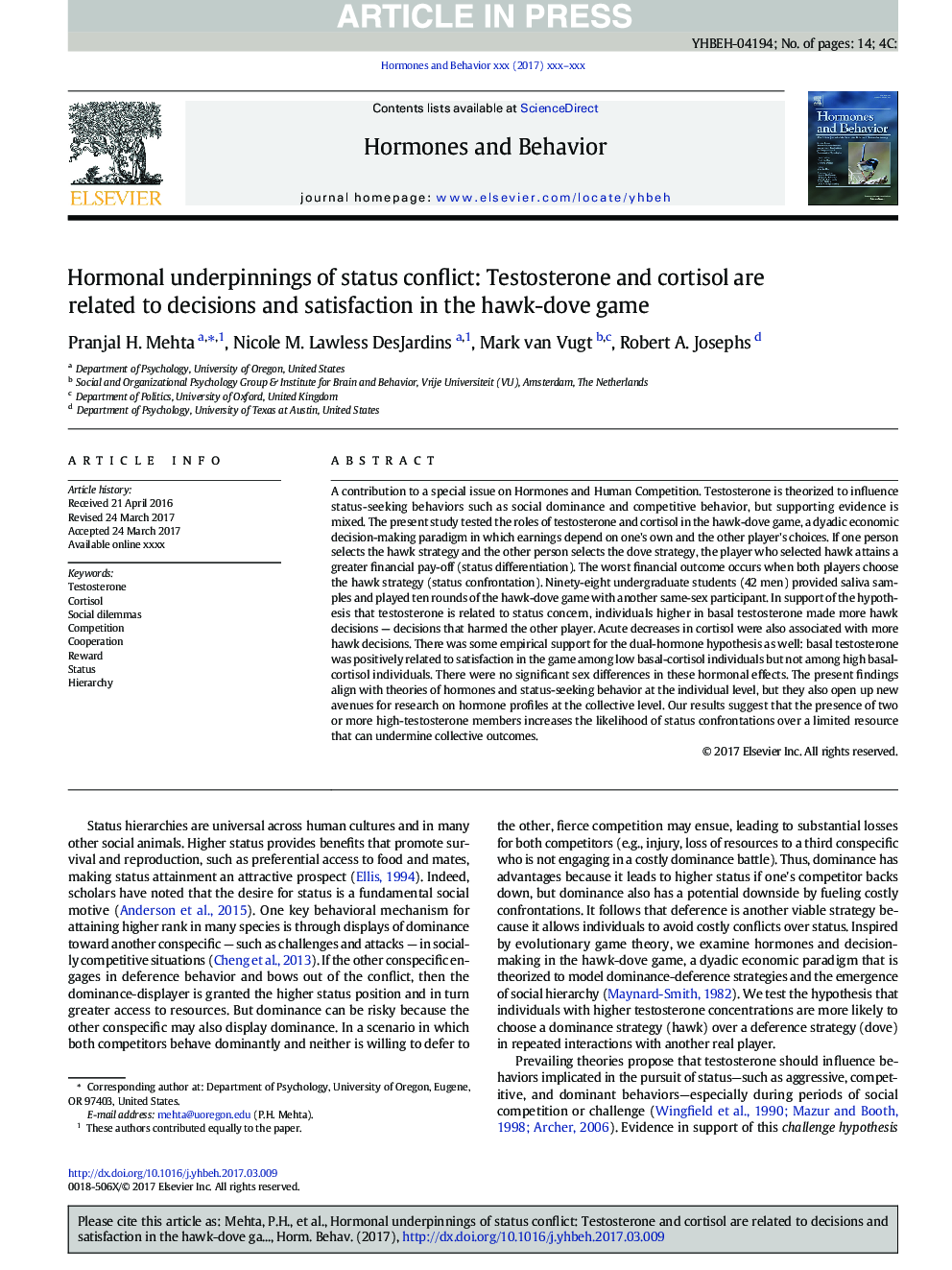| کد مقاله | کد نشریه | سال انتشار | مقاله انگلیسی | نسخه تمام متن |
|---|---|---|---|---|
| 4931157 | 1432748 | 2017 | 14 صفحه PDF | دانلود رایگان |
عنوان انگلیسی مقاله ISI
Hormonal underpinnings of status conflict: Testosterone and cortisol are related to decisions and satisfaction in the hawk-dove game
ترجمه فارسی عنوان
پایه های هورمونی درگیری های وضعیت: تستوسترون و کورتیزول به تصمیم گیری و رضایت در بازی هاوک گوز
دانلود مقاله + سفارش ترجمه
دانلود مقاله ISI انگلیسی
رایگان برای ایرانیان
کلمات کلیدی
تستوسترون، کورتیزول، معضلات اجتماعی، رقابت، همکاری، جایزه، وضعیت، سلسله مراتب،
ترجمه چکیده
کمک به موضوع ویژه در مورد هورمون ها و مسابقه انسانی. تستوسترون برای تأثیر رفتارهای مبتنی بر وضعیت مانند سلطه اجتماعی و رفتار رقابتی تئوری شده است، اما شواهد حمایتی متفاوت است. در این مطالعه، نقش تستوسترون و کورتیزول در بازی قورباغه، یک پارادایم تصمیم گیری اقتصادی که در آن درآمدها به تصمیم خود و دیگر بازیکنان بستگی دارد، مورد آزمایش قرار گرفت. اگر یک شخص استراتژی را انتخاب کند و شخص دیگری استراتژی کوه را انتخاب کند، بازیکنانی که انتخاب می کنند، پول بیشتری را به دست می آورند (تمایز وضعیت). بدترین نتیجه مالی رخ می دهد زمانی که هر دو بازیکن را انتخاب استراتژی قهرمان (مقابله وضعیت). نود و هشت دانشجوی کارشناسی (42 مرد) نمونه های بزاق را تهیه کرده و ده بازی را با بازی یکی دیگر از همجنسگرایان انجام دادند. در حمایت از فرضیه که تستوسترون مربوط به وضعیت نگرانی است، افرادی که در تستوسترون پایه بالاتر هستند، تصمیمات بیشتری را اتخاذ می کنند - تصمیم هایی که به دیگر بازیکنان آسیب می رساند. کاهش شدید کورتیزول نیز با تصمیمات بیشتری در ارتباط بود. برخی از حمایت های تجربی از فرضیه دو هورمون نیز وجود داشت: تستوسترون پایه با رضایت از بازی در میان افراد مبتلا به کمر مبتلا به کورتیزول رابطه مثبت داشت، اما در میان افراد مبتلا به باسن کورتیزول بالا. در این اثرات هورمونی اختلاف معنیداری وجود ندارد. یافته های این پژوهش با نظریه های هورمون ها و رفتارهای جستجوی موقعیتی در سطح فردی همخوانی دارد، اما آنها همچنین راه های جدیدی را برای تحقیق بر روی پروفایل های هورمون در سطح جمعی باز می کنند. نتایج ما نشان می دهد که وجود دو یا بیشتر اعضای تستوسترون با افزایش احتمال مقابله با وضعیت در یک منبع محدود است که می تواند نتایج جمعی را تضعیف کند.
موضوعات مرتبط
علوم زیستی و بیوفناوری
بیوشیمی، ژنتیک و زیست شناسی مولکولی
علوم غدد
چکیده انگلیسی
A contribution to a special issue on Hormones and Human Competition.Testosterone is theorized to influence status-seeking behaviors such as social dominance and competitive behavior, but supporting evidence is mixed. The present study tested the roles of testosterone and cortisol in the hawk-dove game, a dyadic economic decision-making paradigm in which earnings depend on one's own and the other player's choices. If one person selects the hawk strategy and the other person selects the dove strategy, the player who selected hawk attains a greater financial pay-off (status differentiation). The worst financial outcome occurs when both players choose the hawk strategy (status confrontation). Ninety-eight undergraduate students (42 men) provided saliva samples and played ten rounds of the hawk-dove game with another same-sex participant. In support of the hypothesis that testosterone is related to status concern, individuals higher in basal testosterone made more hawk decisions - decisions that harmed the other player. Acute decreases in cortisol were also associated with more hawk decisions. There was some empirical support for the dual-hormone hypothesis as well: basal testosterone was positively related to satisfaction in the game among low basal-cortisol individuals but not among high basal-cortisol individuals. There were no significant sex differences in these hormonal effects. The present findings align with theories of hormones and status-seeking behavior at the individual level, but they also open up new avenues for research on hormone profiles at the collective level. Our results suggest that the presence of two or more high-testosterone members increases the likelihood of status confrontations over a limited resource that can undermine collective outcomes.
ناشر
Database: Elsevier - ScienceDirect (ساینس دایرکت)
Journal: Hormones and Behavior - Volume 92, June 2017, Pages 141-154
Journal: Hormones and Behavior - Volume 92, June 2017, Pages 141-154
نویسندگان
Pranjal H. Mehta, Nicole M. Lawless DesJardins, Mark van Vugt, Robert A. Josephs,
